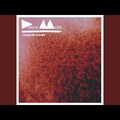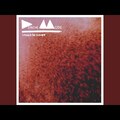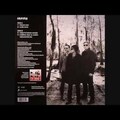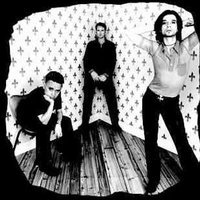
When Depeche Mode started making music back in 1979, plunking out electro-pop charmers on cheap synthesizers in London clubs, they probably couldn’t imagine a time when they would sell a million stadium tickets on the strength of an album no one had yet heard. And here they are, in 2013, having just released their 13th studio album, Delta Machine, on their new label home of Columbia Records. The group, with 30-plus years of music making behind them, is about to embark on yet another world tour, selling out stadiums soon to be filled fans eager to sing along to hits like “Enjoy the Silence,” “Never Let Me Down,” and “Personal Jesus.”
Working together for so long created a lot of tensions within the group. Despite years of well-documented infighting, the band managed to release a new album and go on tour every four years. It’s something that frontman Dave Gahan chalked up to the “undeniable chemistry” between him and the group’s main songwriter Martin Gore—a synergy that created works like Music for the Masses and Violator. Whatever tension existed between the band seems to have evaporated on their latest album, Delta Machine, which was released last week. The album is an ebullient reminder of an enduring partnership— Gore, Gahan and Andy Fletcher are really good at their craft—all too rare in a business known for chewing up and spitting out the best and brightest.
Before the band left on a 34-date stadium tour, which kicks off on May 7 in Tel Aviv, Gahan spoke with TIME about the life and times of Depeche Mode, what drives him, and Delta Machine.
TIME: You’ve been making music for almost 35 years.
Dave Gahan: Yeah it must be something close to that. We were playing gigs at little clubs around London and trying to get out of London in 1979, ’80. Then we put out our first single in 1981. It’s been awhile.
What do you think are some of the biggest changes that you’ve seen in the industry?
It’s totally different. It’s kind of beyond me, really, now. What’s changed the most, I think, is the idea of having an album – of having that special thing in front of you and reading the lyrics and all that stuff – that died the minute the record industry decided to make the compact disc. It was the death, really. Even when they first came out, for me, the packaging was sh–, ‘What is this piece of plastic? It’s nothing special.’
Was Delta Machine released on vinyl?
Yes, it does come out on vinyl, but that was all you sold back then. That’s what people bought. They bought albums or cassettes.
And now HMV just closed in the UK…
There’s no more record stores! In New York I’ve watched them slowly disappear. One thing that happened though, is that I think live music is more popular now than it’s ever been. The possibilities are endless now, with performing, getting your music online, getting your own website and getting your music out there. I think that’s very cool and amazing.
Have you embraced social media?
Personally? No. I barely email. I text, but—put it this way: The other day, my daughter texted me something that was funny, so I texted back to her “LOL” And she texted back to me, “Don’t do that, Dad.” I was like, right, right. I do use texting as a great way to communicate quickly, but I don’t Twitter or anything.
Speaking of technology, as pioneers in the electronic music field, how have the changes in technology affected how you make music?
Funny enough, in the studio we tend to lean towards modular synthesizers, old fashioned synthesizers, from the ’70s through the ’80s.
So you have the exact same equipment you started with?
We have a lot of equipment. Martin [Gore] has a collection of old synthesizers and drum machines that would fill this room, literally. [Ed. Note: It’s a big room.] They are big and old and clunky, but they make great noises. We use soft synths too, online, but not so much on this record. This record was predominantly modular synthesizers that were manipulated and played and sent through amplifiers. Same with drum machines, guitars, and everything. We often manipulate original sound– whatever is creating that sound– through a wall of synthesizers and amplifiers to create a sound that is really interesting to us because of the rhythm or the atmosphere it creates.
But, you know, for me, making records has become …well, I long for it to be a simpler process. Making a record with Depeche Mode is not a simple process. It’s quite complicated and long. We have the luxury of time. I’m not sure that’s such a good thing when you’re being creative. We come into the studio with lots of songs in mind. I’ve demoed songs, Martin’s demoed songs, we have 20 songs and we come into the studio to record them. You would think coming into the studio with songs demoed and ready, that we would come into the studio ready to record them quickly. But we don’t. I kind of like that process of working a little faster in the studio. It gets boring for me. They are in their laboratory surrounded by all these twiddly things with all these things that make bleeps and noises and I sit there, like, “Can I sing now? Can I sing now? Can I sing now?”
Has that always been your process?
Yeah, I’ll just go in the other room and fiddle around on my guitar. Now, I don’t waste my time. We recorded a chunk of Delta Machine at Jungle City, Alicia Keyes’ place, and we recorded a bunch of it out in Santa Barbara where Martin lives in a downtown studio there. But Martin has his own studio and I have my own studio – they’re both small places. So when they are working in the main studio, I’ll be in the little studio – mine or Martin’s – doing vocals. They might be working on one track during the day, and I’ll say to the producer, ‘It sounds good, give it to me now before you start fiddling with it too much.’ Then I’ll go do vocals, give it to the producer, he’ll shove it in a computer and see what works, what has to go. It’s like a puzzle. It’s a continuous thing. We don’t close the door on it all until its finished. Each song goes through many different interpretations. As Martin always says, we always go thorough a reggae version of the song and it never ends up there, but it gets that beat going on. We’ll try a blues-driven beat. We speed it up, we change the key, we’ll play with it until it works.
Do you have a favorite song on this record or is there one that you think holds the album together?
On this record, for me, one of the key songs was “Heaven,” which isn’t probably the most obvious of singles, but Martin and I felt it represented the record in lots of ways, which is why we wanted to put it out first. It’s not like we felt it was going to be a big hit or something, but that doesn’t really drive us to make music. We all like to have hits, it’s nice to have hits, of course, but after making 13 records together, it’s not what drives you. What drives you is to make a great record. That’s what still drives me. Certain songs propel that. “Heaven” is one of those songs. When Martin played the demo for me, I was in. It’s gospel-y bluesy, it’s right up my street. Songs like that speak to me. I hope I can write one someday. I did a Soulsavers project last year and we wrote a bunch of songs together and there are some songs like that on there. This song would fit very well on The Light the Dead See. That’s where I’m at right now, a gospel-y bluesy thing just speaks to me.
Which, of course, is the antithesis of what people think of when they think Depeche Mode.
The title Delta Machine describes it, though. It’s influenced by the blues, but it’s made by machines. It’s what we do and this album embraces that more than the last couple. Every album leads you to the next one somehow. Sometimes, you make a record and you’re not quite sure why you’re making it, but you find out when you make the next one.
As an artist who has such an ardent fanbase and impressive discography, do you feel tied to the past at all? Or do you just make what you are driven to create and hope the fans like it?
It’s probably the latter. There’s a lot of talk like that in the recording studio from record companies and you have to watch out for it. They’ll say, ‘Oh that sounds like old-school Depeche’ and alarm bells go off for me. Martin and I have an undeniable chemistry together, and you don’t mess with it, it just is. His songs speak to me. I don’t know why that is, but it works. For me, when I start hearing people in the studio saying that it sounds old-school or that it sounds like something that is far away from who we are I’m, like, ‘Great let’s go far away from who we are.’ Because it’s like a clock, you can try and get away from who you are, but it will come right back round. It’s my voice, it’s Martin’s influences, there’s a style that the song is written and arranged. It’s good to take it away. There are some fans who will love this record, and there are some who think, ‘I don’t like this record, because it doesn’t sound like that one.’ You have to keep moving forward as an artist. It’s a ridiculous idea to try and repeat a process. I am afraid of that. If we go in the studio and it feels too normal, then you’re not pushing yourself. The moment that happens, I think Martin and I will look at ourselves and say, ‘We’re finished.’ [laughs] Why stay in the same band and limit myself as a musician?
Have you ever wanted to do anything else career-wise?
It’s great being in a band. If it doesn’t work and you’re just fighting other bulls–t and the music’s put on the side, you gotta move on. You have to find the right spot. I was lucky to find that right when I was about to throw in the towel. Before we made Exciter …we began making that record and it felt like, ‘We’ve done this.’ For me, it did, anyway. I don’t know if Martin and Fletch did. I had demoed a bunch of songs, but it was clear that the band was not interested in any of my writing aspirations. I played a couple of things and there was literally no reaction. I remember being quite upset about that. I didn’t vocally say anything, but I was quite upset. Like, ‘F— you guys!’ — but the message I got was, that’s not what you do—you sing. I made a decision that I was going to work really hard on my vocals. I was going to go on the Exciter tour and then I was going to go in the studio — with different people.
That, for me, was the beginning of actually becoming very enthusiastic about making music. I was getting to the point where I wanted to go paint or something. I wasn’t interested in making music anymore. I wasn’t interested in myself as an artist. I wasn’t stimulated. I didn’t know it then, though, but now I see it. I had, like, 15 or 16 songs that eventually became the record Paper Monsters. And, then, forming a band to tour with that for six months, changed my whole outlook. Then, I was ready to go back in the studio to make Playing The Angel with Depeche Mode. I don’t think I would have done that without making the Paper Monsters album and touring, though.
Is that a lesson that you would want to pass on to younger artists? Make sure you’re doing what you love?
When you’re younger and you’re driven by something that seems much larger than life when you begin. You’re in a band. You’re in the back of a van, traveling from gig to gig, and it’s just you against the world. It’s cool! It’s the greatest thing.
Do you miss that?
I got it back when I did the Paper Monsters tour. There was a lot of that, where we were just in the back of the van, traveling through Europe, getting held at borders, barely making the gig, running on stage. It was fun. So I try to make this fun now. Touring with Depeche Mode is a whole different thing. This tour that we’re doing in Europe now, it’s 30 shows and we’ve already sold a million tickets. That’s beyond what we couldn’t have imagined. But touring with Depeche Mode is a production. There’s a hundred people in the crew and lights and show—and a lot is expected. That’s what we try to live up to. Depeche Mode has become something that I see very clearly …our fans who come to the gigs, they know us. They know our music. It means something to them. It means something in their life, or it meant something, anyway. Thirty years is a long time. It’s why people walk up to me on the street in New York and say, ‘That record got me through college!’ or ‘That song came on when my daughter was born.’ I get more of that than anything else and that’s a really nice feeling, to have meant something. To be part of something that means something to people.






